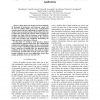Free Online Productivity Tools
i2Speak
i2Symbol
i2OCR
iTex2Img
iWeb2Print
iWeb2Shot
i2Type
iPdf2Split
iPdf2Merge
i2Bopomofo
i2Arabic
i2Style
i2Image
i2PDF
iLatex2Rtf
Sci2ools
135
click to vote
IPPS
2010
IEEE
2010
IEEE
Using focused regression for accurate time-constrained scaling of scientific applications
Many large-scale clusters now have hundreds of thousands of processors, and processor counts will be over one million within a few years. Computational scientists must scale their applications to exploit these new clusters. Time-constrained scaling, which is often used, tries to hold total execution time constant while increasing the problem size along with the processor count. However, complex interactions between parameters, the processor count, and execution time complicate determining the input parameters that achieve this goal. In this paper we develop a novel gray-box, focused regression-based approach that assists the computational scientist with maintaining constant run time on increasing processor counts. Combining application-level information from a small set of training runs, our approach allows prediction of the input parameters that result in similar per-processor execution time at larger scales. Our experimental validation across seven applications showed that median pre...
Computational Scientist | Distributed And Parallel Computing | Execution Time | IPPS 2010 | Processor Counts |
| Added | 13 Feb 2011 |
| Updated | 13 Feb 2011 |
| Type | Journal |
| Year | 2010 |
| Where | IPPS |
| Authors | Bradley J. Barnes, Jeonifer Garren, David K. Lowenthal, Jaxk Reeves, Bronis R. de Supinski, Martin Schulz, Barry Rountree |
Comments (0)

